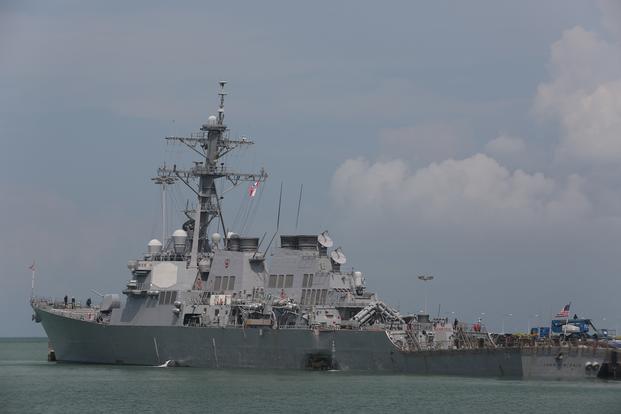As loved ones and comrades gathered in Japan this week to honor the 10 sailors killed aboard the guided-missile destroyer John S. McCain one year ago, Navy officials are still working through how best to implement more than 100 recommendations to prevent similar tragedies from occurring.
Seventy-eight of the 110 recommendations made after lengthy investigations into a spate of mishaps in the Asia-Pacific region are "fully underway," Navy Secretary Richard V. Spencer told reporters at the Pentagon earlier this month.
The McCain was the second ship involved in a deadly collision in 2017. Months before that collision with a merchant vessel off the coast of Singapore, the guided-missile destroyer Fitzgerald collided with a container ship off the coast of Japan. Seven sailors were killed in that accident.
Two other Navy ships in the region were involved in incidents earlier in the year, including a grounding and a more minor collision. Those incidents did not result in fatalities.
As the Navy looks to fix the problems that led up to the troubling trend, Spencer said the remaining 32 recommendations will require more time, money and long-term cultural shifts in how the organization addresses problems.
"To be very frank, you have an absorption issue -- you can really only put so much out into the fleet," the Navy secretary said. "You really want them to absorb A, absorb B, absorb C. You don't want them to absorb 30 percent of each."
He estimated that about half of the remaining recommendations need to be carefully timed. The other half will require money from future budgets, he said.
The Navy established a council earlier this year that would oversee changes to the fleet. Some changes were easier to implement than others, Spencer said.
For example, ship crews have now been directed to turn on their vessels' automatic-identification systems when crossing high-traffic areas, allowing other ships to spot them more easily. Spencer called that fix a "check the box" solution they could easily communicate to the fleet and enforce.
Other proposed changes, like a sweeping overhaul to the surface-warfare officer training pipeline, are underway, but it will take time to see results. A new policy in implementation will limit who's able to pursue a SWO qualification in order to free up vital training time that needs to be set aside only for those officers who will command ships in the future.
Still other recommendations are going to require what Spencer called long-term cultural fixes for the Navy.
He said he'd like to see the Navy become a fast-learning organization -- one that innovates, experiments and thinks quickly about how it will respond to future threats and challenges.
"That's going to be a big rock to move," Spencer said. "I can pound that drum. I can tell people 'Hey, you looking at the problem, give me a newer process.'"
Too often, though, he said rank-and-file sailors and Marines don't think they can speak up to their leaders when they think they have a better way of doing something. That needs to change, he said, but it's going to take time.
Spencer and other leaders are also working to address serious readiness shortfalls that left the Navy pushing its people and equipment to a breaking point. Sailors reported being so busy they were often sleep-deprived. And deployments were often extended in the event of a humanitarian or security crisis in the region in which they were operating, which wreaks havoc on ship maintenance schedules.
Spencer has looked to the private sector to see what best practices he can apply from industries like commercial airlines to improve Navy readiness. The Navy, he said, has created a clear line of ownership for maintenance and is also working to push more responsibility down the chain of command, which will empower leaders to make more immediate decisions about repairs, rather than forcing them through a lengthy approval process.
"This sounds easy ... but you're culturally rewiring [the service]," he said.
--Gina Harkins can be reached at gina.harkins@military.com. Follow her on Twitter at @ginaaharkins.












